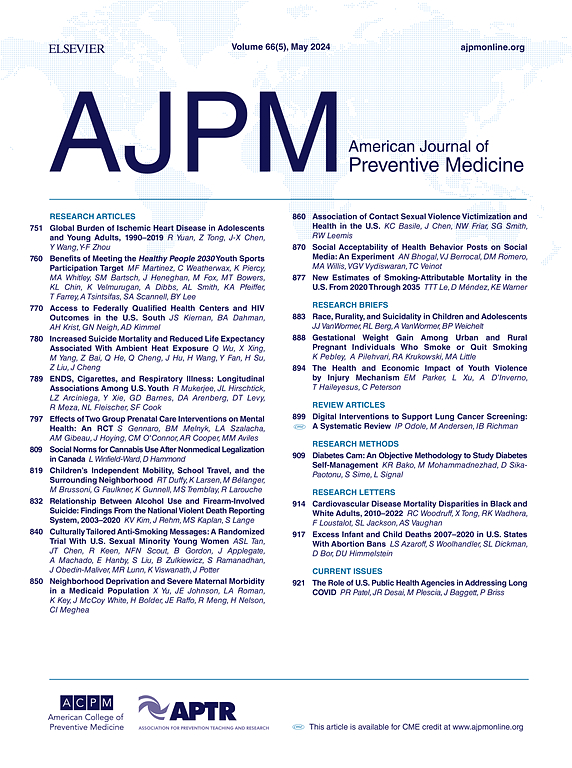伊利诺伊州阿片类药物替代试点项目中的医用大麻和心理健康。
IF 4.3
2区 医学
Q1 MEDICINE, GENERAL & INTERNAL
引用次数: 0
摘要
简介:在伊利诺伊州,实施了阿片类药物替代试点计划(OAPP),为个人提供医用大麻作为阿片类药物的直接替代品。尽管医用大麻经常用于治疗心理健康症状,但人们对医用大麻对整体心理健康的作用知之甚少。因此,本研究的目的是在第一个OAPP队列中检查医用大麻使用与PWB的关系。方法:于2019年2月至7月对参加OAPP的人员进行调查。将大麻使用者(n=626)与非使用者(n=234)进行比较,以确定过去一年内大麻使用与PWB之间是否存在关联。PWB的评分为1至5分(“1”为“差”;“5”代表“优秀”)。采用后向逐步回归模型。还进行了敏感性分析,以确定“经常使用大麻”(每周使用3次或更多)与“不使用大麻”之间是否存在关联。结果:研究样本包括860名参与者。平均年龄47岁(SD 14.2);60%的研究对象为男性;72%的患者不是西班牙裔、拉丁裔或西班牙裔;67%的人已婚,67%的大麻使用者报告有残疾。平均感知PWB为3.18 (SD 0.94)(“良好”),两组之间PWB无统计学差异(使用者:3.21 (SD 1.01);非用户:3.12 (SD 0.71);p = 0.18)。结论:在这个OAPP参与者队列中,大麻使用者和非使用者之间的PWB没有临床意义的差异。本文章由计算机程序翻译,如有差异,请以英文原文为准。
Medical Cannabis and Psychological Well-Being in Illinois’ Opioid Alternative Pilot Program
Introduction
In Illinois, the Opioid Alternative Pilot Program was implemented to provide individuals access to medical cannabis as a direct substitute for opioids. Despite medical cannabis being frequently used for mental health symptoms, little is known about medical cannabis’ role on overall psychological well-being. Hence, the objective of this study is to examine the association of medical cannabis use with psychological well-being among the first Opioid Alternative Pilot Program cohort.
Methods
A survey was sent from February–July 2019 to those who enrolled in the Opioid Alternative Pilot Program. Cannabis users (n=626) were compared with nonusers (n=234) to determine whether there was an association between cannabis use within the past year and psychological well-being. Psychological well-being was measured on a scale of 1–5 (1 being poor and 5 being excellent). Backward stepwise regression models were used. Sensitivity analysis was also conducted to determine whether there was an association between regular cannabis use (using 3 or more times a week) and no cannabis use.
Results
The study sample included 860 participants. The average age was 47 (SD=14.2) years; 60% of the cohort was male; 72% were not of Hispanic, Latino, or Spanish origin; 67% were married; and 67% of cannabis users reported having a disability. The average perceived psychological well-being was 3.18 (SD=0.94) (good), with no statistically significant difference in psychological well-being between the 2 groups (users: 3.21 [SD=1.01]; nonusers: 3.12 [SD=0.71]; p=0.18).
Conclusions
In this cohort of Opioid Alternative Pilot Program participants, there was no clinically meaningful difference in psychological well-being between cannabis users and nonusers.
求助全文
通过发布文献求助,成功后即可免费获取论文全文。
去求助
来源期刊

American Journal of Preventive Medicine
医学-公共卫生、环境卫生与职业卫生
CiteScore
8.60
自引率
1.80%
发文量
395
审稿时长
32 days
期刊介绍:
The American Journal of Preventive Medicine is the official journal of the American College of Preventive Medicine and the Association for Prevention Teaching and Research. It publishes articles in the areas of prevention research, teaching, practice and policy. Original research is published on interventions aimed at the prevention of chronic and acute disease and the promotion of individual and community health.
Of particular emphasis are papers that address the primary and secondary prevention of important clinical, behavioral and public health issues such as injury and violence, infectious disease, women''s health, smoking, sedentary behaviors and physical activity, nutrition, diabetes, obesity, and substance use disorders. Papers also address educational initiatives aimed at improving the ability of health professionals to provide effective clinical prevention and public health services. Papers on health services research pertinent to prevention and public health are also published. The journal also publishes official policy statements from the two co-sponsoring organizations, review articles, media reviews, and editorials. Finally, the journal periodically publishes supplements and special theme issues devoted to areas of current interest to the prevention community.
 求助内容:
求助内容: 应助结果提醒方式:
应助结果提醒方式:


